
Endospan recently announced the presentation of 30-day results from the statistical dissection primary arm of the TRIOMPHE investigational device exemption (IDE) clinical study. The data were presented during the late-breaking trial session at the American Association for Thoracic Surgery (AATS) annual meeting (2–5 May, Seattle, USA).
The TRIOMPHE study is a prospective, multicentre, three-arm trial designed to assess the safety and effectiveness of the Nexus aortic arch stent-graft system in patients with aortic arch pathologies (dissection, aneurysm, penetrating aortic ulcer [PAU]/intramural haematoma [IMH]).
It was reported during the session that the 30-day results from the TRIOMPHE study are promising for aortic arch treatment in zone 0 with the Nexus system. Announcing the results in a press release, Endospan notes: “The study results suggest the Nexus device may be an acceptable alternative to open aortic arch replacement in select patients at high risk for open surgery.”
Results
|
|
TRIOMPHE (n=54) |
|
Operative mortality |
0.0% |
|
30-day mortality |
9.2% (n=5) |
|
Overall disabling stroke (bypass + Nexus) Post bypass Post Nexus |
5.6% (n=3) 1.9% (n=1) 3.7% (n=2) |
|
Renal failure |
0.0% |
|
Paraplegia |
0.0% |
Further, core lab analysis of stent-graft sealing shows no type Ia, no type Ib and no type III endoleaks, suggesting good sealing at 30 days.
“The 30-day data from the TRIOMPHE study are highly encouraging for the treatment of aortic arch disease,” said Brad Leshnower (Emory University School of Medicine, Atlanta, USA), national cardiac principal investigator. “The low stroke rate, in particular, is a significant achievement. This data is very promising while we await one-year follow-up of the study patients.”
“As a vascular surgeon, I am excited about the potential of the Nexus aortic arch stent-graft to provide a less invasive treatment option for patients with complex aortic arch pathologies,” said Ross Milner (UChicago Medicine, Chicago, USA), national vascular principal investigator.













